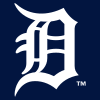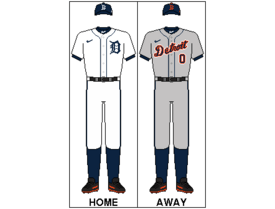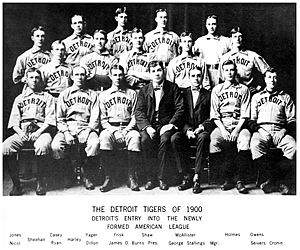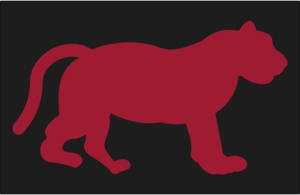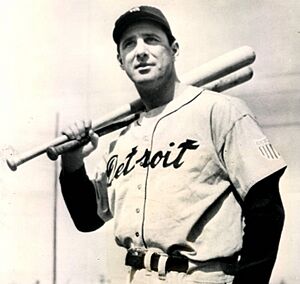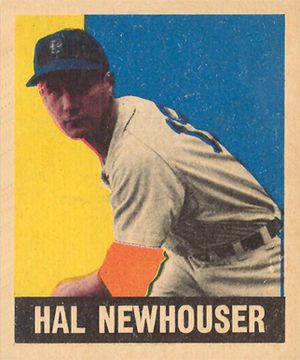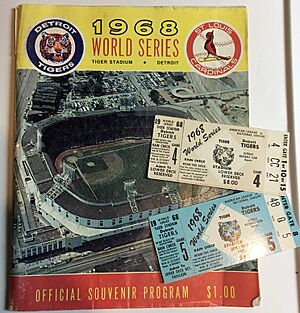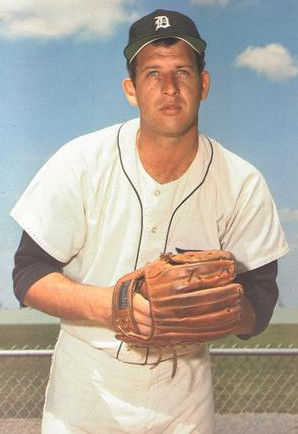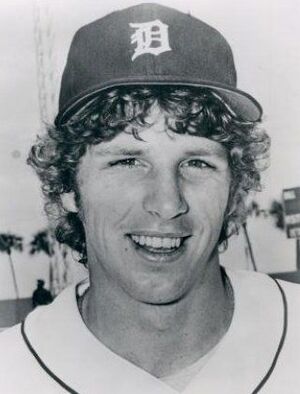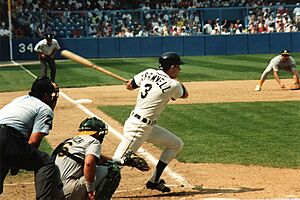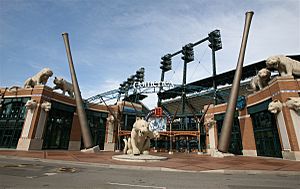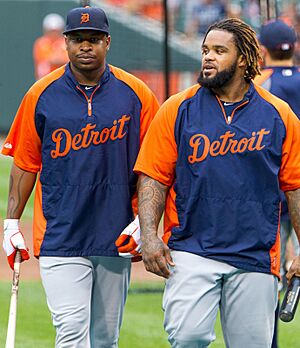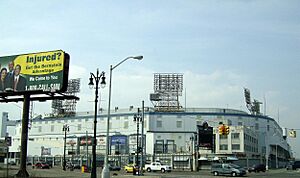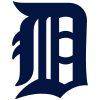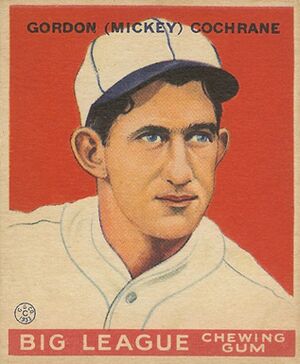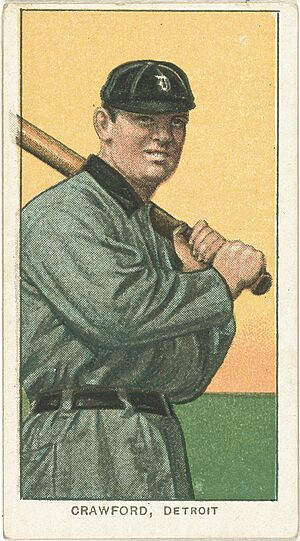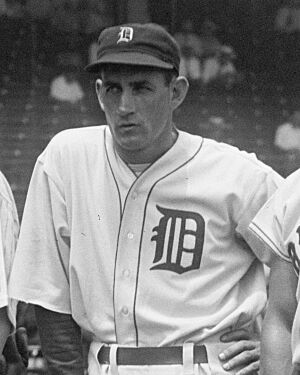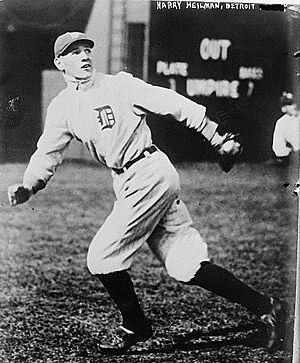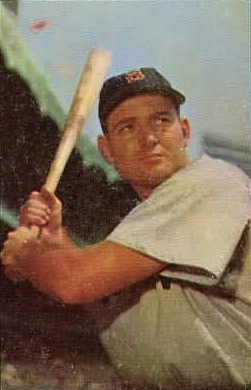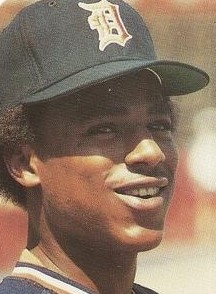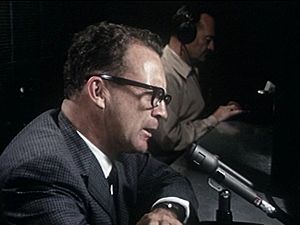Detroit Tigers facts for kids
Quick facts for kids Detroit Tigers |
|||||
|---|---|---|---|---|---|
|
|||||
|
|||||
| Major league affiliations | |||||
|
|||||
| Current uniform | |||||
| Retired numbers | |||||
| Colors | |||||
|
|||||
| Name | |||||
|
|||||
| Other nicknames | |||||
|
|||||
| Ballpark | |||||
|
|||||
| Major league titles | |||||
| World Series titles (4) |
|
||||
| AL Pennants (11) |
|
||||
| AL Central Division titles (4) |
|
||||
| AL East Division titles (3) |
|
||||
| Wild card berths (3) |
|
||||
| Front office | |||||
| Principal owner(s) | Ilitch Holdings | ||||
| President of baseball operations | Scott Harris | ||||
| General manager | Jeff Greenberg | ||||
| Manager | A. J. Hinch | ||||
The Detroit Tigers are a professional baseball team from Detroit, Michigan. They play in Major League Baseball (MLB) as part of the American League (AL) Central Division. The Tigers are one of the original teams of the American League, starting in Detroit in 1894. They are the only team from the old Western League that still plays in its first city and under its original name.
Since becoming a major league team in 1901, the Tigers have won four World Series championships (in 1935, 1945, 1968, and 1984). They have also won 11 American League titles and several division championships. Since 2000, the Tigers have played their home games at Comerica Park in Downtown Detroit.
The Tigers built Bennett Park in 1896 and played there until 1911. In 1912, the team moved to Navin Field, which was later expanded and renamed Briggs Stadium in 1938. It became Tiger Stadium in 1961, where the Tigers played until 1999. From 1901 to 2025, the Tigers' overall record is 9,763–9,642–93. Their best winning year was 1934, and their toughest was 2003.
Contents
- History of the Detroit Tigers
- Early Years and the Western League (1894–1900)
- First Major League Season (1901)
- The Ty Cobb Era (1905–1926)
- Breaking Through (1927–1940)
- The War Years and Another Championship (1941–1945)
- A Long Drought (1946–1967)
- Glory in '68 and Beyond (1968–1972)
- A Period of Change (1973–1978)
- The "Bless You Boys" Era (1979–1987)
- A New Approach (1988–1995)
- The Randy Smith Era and Tough Times (1996–2002)
- Most Losses in Team History (2003)
- Rebuilding and a Return to the World Series (2004–2006)
- Falling Short (2007–2010)
- Division Winners (2011–2014)
- Mid-Season Reboot (2015)
- A Strong Effort (2016)
- Rebuilding the Team (2017–2023)
- Return to the Playoffs (2024–Present)
- Best Seasons in Detroit Tigers History
- Worst Seasons in Detroit Tigers History
- Team Nickname: The Tigers
- Team Rivalries
- Tigers Fanbase
- Home Attendance at Comerica Park
- Team Rally Cries
- Uniforms and Logos
- Baseball Hall of Famers
- Retired Numbers and Honorees
- Award Winners
- Team Roster
- Minor League Teams
- Broadcasters
- Team Facilities
- See Also
History of the Detroit Tigers
Early Years and the Western League (1894–1900)
The Tigers team started in 1894 as part of the Western League. They first played at Boulevard Park. In 1895, the owner, George Vanderbeck, built Bennett Park. This park became the team's home for the next 104 seasons. The first game at Bennett Park was on April 13, 1896. The team, sometimes called the "Tigers," won 30–3 against a local team.
The Western League changed its name to the American League in 1900. At first, it was a minor league. But the next year, it became a major league, competing with the National League.
First Major League Season (1901)
The Tigers became one of the first teams in the new major league American League in 1901. Their first major league game was on April 25, 1901, at Bennett Park. About 10,000 fans watched them make an amazing comeback. They were losing 13–4 in the ninth inning but won 14–13! The team finished third that year.
In that first season, they were the first major league team to have a mascot on their cap. It was a red tiger on a dark background. In 1903, it changed to a "D," and their famous Olde English "D" appeared in 1904.
The Ty Cobb Era (1905–1926)
Ty Cobb Joins the Team (1905)
In 1905, the Tigers got an 18-year-old player named Ty Cobb. He was a very determined player and became one of the greatest of all time. With Cobb, and other great players like Sam Crawford and Hughie Jennings, the team quickly became stronger.
American League Champions (1907–1909)
The Tigers won the AL pennant in 1907, 1908, and 1909. This meant they played in the World Series three times in a row! However, they lost all three World Series. In 1907 and 1908, they lost to the Chicago Cubs. In 1909, they lost to the Pittsburgh Pirates in seven games.
In 1909, Ty Cobb had an incredible season. He won the batting triple crown, leading the league in batting average (.377), home runs (9), and RBIs (107). He also led in stolen bases.
Highlights and Challenges (1910–1914)
The Tigers had some ups and downs. In 1912, George Mullin pitched the team's first no-hitter. Ty Cobb was suspended for a game in 1912 after a disagreement with a fan. During these years, Cobb won the batting title every season.
A Record-Breaking Season (1915)
In 1915, the Tigers won 100 games, which was a club record at the time. They almost won the AL pennant but finished just one game behind the Boston Red Sox. Their outfield, with Ty Cobb, Sam Crawford, and Bobby Veach, was considered one of the best ever.
Later Years with Cobb (1916–1926)
Cobb continued to be a star, joined by Harry Heilmann. In 1921, the Tigers had a team batting average of .316, the highest in AL history. Heilmann and Cobb were the top two hitters in the league that year. However, the team's pitching wasn't as strong.
Ty Cobb retired from the Tigers in 1926 after 22 seasons.
Breaking Through (1927–1940)
Building a Strong Team (1927–1933)
After Cobb left, the Tigers built a new strong team. They added powerful first baseman Hank Greenberg and talented pitchers Tommy Bridges and Schoolboy Rowe. Second baseman Charlie Gehringer was already a key player. In 1933, they added catcher Mickey Cochrane as a player-manager.
American League Champions (1934)
In 1934, the Tigers won the AL pennant with 101 wins, their best winning percentage ever. The team's infield was very strong, and Schoolboy Rowe won 24 games. They played the "Gashouse Gang" St. Louis Cardinals in the 1934 World Series and lost in seven games. In a controversial moment in Game 7, a Cardinals player had to be removed from the game for his safety after fans became upset.
First World Series Championship (1935)
The 1935 Tigers had four future Hall of Famers: Hank Greenberg, Mickey Cochrane, Goose Goslin, and Charlie Gehringer. Greenberg was named AL MVP, leading the league in home runs and RBIs. The Tigers finally won their first World Series, beating the Chicago Cubs 4–2. Goose Goslin hit the game-winning single in Game 6.
More Strong Seasons (1936–1939)
The Tigers continued to be a strong team. In 1938, Hank Greenberg almost broke Babe Ruth's single-season home run record, hitting 58 homers.
American League Champions (1940)
In 1940, the Tigers won the AL pennant in a very close race. Hank Greenberg moved to left field to make room for Rudy York at first base, and both had amazing seasons. Greenberg won his second AL MVP award. Pitcher Bobo Newsom was the team's ace. The Tigers lost the 1940 World Series to the Cincinnati Reds in seven games.
The War Years and Another Championship (1941–1945)
During World War II, many players, including Hank Greenberg, served in the military. The team struggled but had strong pitching from Hal Newhouser and Dizzy Trout. Newhouser won two AL MVP awards in 1944 and 1945.
World Series Champions (1945)
With Hank Greenberg back from the military, the Tigers won the AL pennant in 1945. Hal Newhouser had an incredible year, winning the pitching triple crown (leading in wins, ERA, and strikeouts) and his second straight AL MVP. The Tigers won their second World Series, defeating the Chicago Cubs 4–3. This was the first time the Tigers won a Game 7 in the World Series.
A Long Drought (1946–1967)
Post-War Years (1946–1950)
After their World Series win, the Tigers had several winning seasons but couldn't win another pennant. Hal Newhouser continued to be a top pitcher. The team also acquired George Kell, a great third baseman who won the batting title in 1949.
Challenges and New Stars (1951–1960)
The 1950s were tough for the Tigers, with many losing seasons. In 1952, pitcher Virgil Trucks threw two no-hitters in one season, a rare achievement. In 1953, a young outfielder named Al Kaline joined the team. He became one of the few players to go straight to the major leagues without playing in the minor leagues. In 1955, at age 20, Kaline became the youngest batting champion in major league history. In 1958, the Tigers became one of the last teams to have players of all backgrounds join their roster when Ozzie Virgil Sr. joined.
A Strong Season (1961)
In 1961, the Tigers won 101 games, a huge improvement from the previous year. However, they finished second to the New York Yankees. Norm Cash won the batting title with a .361 average. The team also featured non-white starters like Bill Bruton and Jake Wood.
Building for the Future (1962–1966)
The Tigers continued to build a strong team in the 1960s. Young pitchers like Mickey Lolich and Denny McLain joined, along with outfielders Willie Horton and Jim Northrup.
A Close Pennant Race (1967)
In 1967, the Tigers were in a very close race for the pennant. They needed to win both games of a doubleheader on the last day of the season to force a playoff. They won the first game but lost the second, missing the pennant by just one game.
Glory in '68 and Beyond (1968–1972)
World Series Champions (1968)
The Tigers finally returned to the World Series in 1968. They led the league for most of the season, finishing with 103 wins. Pitcher Denny McLain had an amazing year, winning 31 games, which was the first time a pitcher had done that since 1934. He won the AL MVP and Cy Young Award.
1968 World Series Victory
In the 1968 World Series, the Tigers played the St. Louis Cardinals. The Cardinals had a great pitcher named Bob Gibson, who struck out a World Series record 17 batters in Game 1. But the Tigers fought back. Pitcher Mickey Lolich won Games 2 and 5. A key moment was in Game 5 when Willie Horton made a perfect throw to home plate to stop a Cardinals runner from scoring.
In Game 7, Lolich pitched against Gibson. Both were excellent, but the Tigers scored three runs in the seventh inning, thanks to a big hit by Jim Northrup. The Tigers won Game 7, 4–1, and the World Series, 4–3! They were only the third team to win the World Series after being down 3–1. Mickey Lolich was named the World Series MVP.
New Divisions and New Managers (1969–1971)
In 1969, MLB created divisions, and the Tigers joined the American League East. Denny McLain won another Cy Young Award. In 1970, Billy Martin became the manager. The Tigers made some important trades, getting pitcher Joe Coleman and infielders Eddie Brinkman and Aurelio Rodríguez. In 1971, Mickey Lolich set a team record with 308 strikeouts.
AL East Champions (1972)
In 1972, the Tigers won their first AL East division title. Eddie Brinkman was named Tiger of the Year for his excellent fielding. Mickey Lolich won 22 games, and Joe Coleman won 19. Pitcher Woodie Fryman joined the team late in the season and helped them clinch the division.
1972 ALCS Challenge
In the 1972 American League Championship Series (ALCS), the Tigers played the Oakland Athletics. It was a tough series. In Game 1, a controversial moment happened when a Tigers pitcher hit an A's player with a pitch, leading to suspensions. The Tigers fought hard, winning Game 3 with Joe Coleman striking out 14 batters. Game 4 was another close win for Detroit. But in Game 5, a disputed call at first base helped the A's score a key run, and the Tigers lost the series.
A Period of Change (1973–1978)
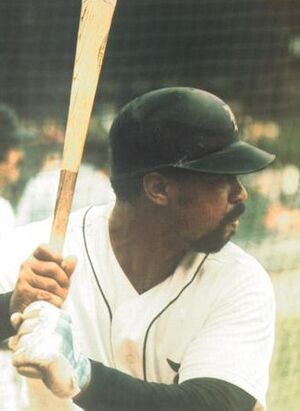
The Tigers dropped in the standings in 1973. Manager Billy Martin was fired after some controversial actions. A bright spot was relief pitcher John Hiller, who had a great season after recovering from a heart attack. He set a team record with 38 saves.
Al Kaline Retires (1974)
Al Kaline retired in 1974 after getting his 3,000th career hit. He was elected to the Baseball Hall of Fame in 1980.
The Year of The Bird (1976)
In 1976, a rookie pitcher named Mark Fidrych became very popular. Known as "The Bird" for his unique style, he talked to the baseball and had other fun quirks. He had an amazing season, winning 19 games and leading the AL in ERA. Fidrych won the AL Rookie of the Year award.
New Talent Arrives (1977–1978)
Injuries limited Fidrych's career, but new young stars were joining the team. Jack Morris, Lance Parrish, Alan Trammell, and Lou Whitaker all made their debuts in 1977. These players would become key to the Tigers' future success.
The "Bless You Boys" Era (1979–1987)
In 1979, Sparky Anderson became the Tigers' manager. He was a very successful manager who had won two World Series with the Cincinnati Reds. Anderson boldly predicted that the Tigers would win a pennant within five years.
World Series Champions (1984)
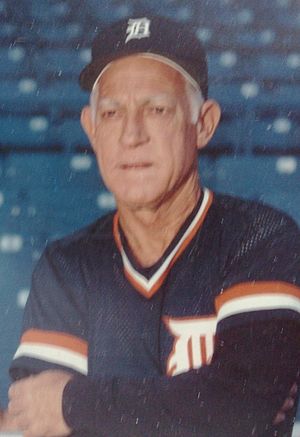
The 1984 season was incredible for the Tigers. They started with a 9–0 record, including Jack Morris pitching a no-hitter. They won 35 of their first 40 games and cruised to a team-record 104 victories. The Tigers led their division from the very first day of the season. Closer Willie Hernández had an amazing year, winning both the Cy Young Award and AL MVP.
1984 ALCS and World Series
The Tigers swept the Kansas City Royals in the ALCS, winning 3–0. This sent them to the 1984 World Series against the San Diego Padres.
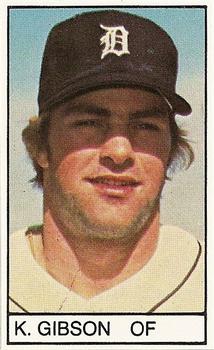
The Tigers won Game 1 in San Diego. When the series moved to Detroit, the Tigers took control. Alan Trammell hit two home runs in Game 4. In Game 5, Kirk Gibson hit a famous three-run home run in the eighth inning, sealing the victory. The Tigers won the World Series 4–1, sparking huge celebrations in Detroit. Sparky Anderson became the first manager to win the World Series in both the American and National Leagues.
AL East Champions (1987)
After a few years, the Tigers won the AL East division title again in 1987. They had a very exciting race with the Toronto Blue Jays, winning a crucial game on the last day of the season. Pitcher Frank Tanana threw a complete-game shutout to clinch the division. However, the Tigers lost to the Minnesota Twins in the ALCS.
A New Approach (1988–1995)
Challenges and Power Hitters (1988–1991)
The Tigers struggled in 1989, finishing with the worst record in MLB. The team then tried a new strategy, focusing on power hitters like Cecil Fielder, Rob Deer, and Mickey Tettleton. In 1990, Cecil Fielder hit 51 home runs, becoming the first player to hit 50 since 1977.
New Ownership and Manager Retirement (1992–1995)
In 1992, Mike Ilitch, the owner of Little Caesars Pizza, bought the team. One of his first actions was to rehire beloved broadcaster Ernie Harwell. Sparky Anderson also set a new record for most wins as a Tigers manager. After the 1995 season, Sparky Anderson retired from baseball.
The Randy Smith Era and Tough Times (1996–2002)
From 1994 to 2005, the Tigers had many losing seasons. In 1996, they lost 109 games, a team record at the time. In 1998, the Tigers moved from the AL East to the AL Central division.
In 2000, the team moved from Tiger Stadium to Comerica Park. At first, some thought Comerica Park was too big for home runs, but changes were made to the field dimensions to make it fairer for hitters. In 2001, Dave Dombrowski became the team president.
Most Losses in Team History (2003)
In 2003, the Tigers had their toughest season ever, finishing with a 43–119 record. This was the worst record in franchise history. Pitcher Mike Maroth lost 20 games that year. Former Tigers shortstop Alan Trammell was hired as manager to help rebuild the team.
Rebuilding and a Return to the World Series (2004–2006)
Improving the Team (2004–2005)
After the difficult 2003 season, the Tigers worked hard to improve. They signed new talented players like Iván Rodríguez and Carlos Guillén. In 2004, the team improved by 29 wins. In 2005, Detroit hosted the MLB All-Star Game. At the end of 2005, Jim Leyland became the new manager.
American League Champions (2006)
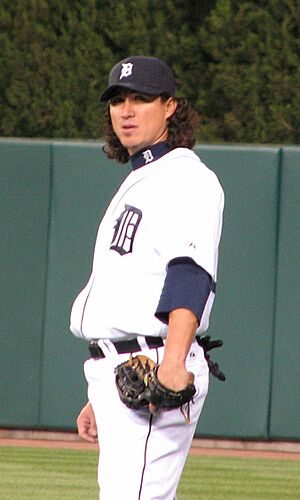
The 2006 season was a huge turnaround! Young players like Justin Verlander, Curtis Granderson, and Joel Zumaya helped the team become very strong. The Tigers had their first winning season since 1993 and clinched a playoff spot. They finished second in their division, earning a wild card spot.
In the playoffs, the Tigers surprised many by beating the New York Yankees in the ALDS. They then swept the Oakland Athletics in the ALCS, with Magglio Ordóñez hitting a game-winning home run. The Tigers reached the 2006 World Series but lost to the St. Louis Cardinals.
Falling Short (2007–2010)
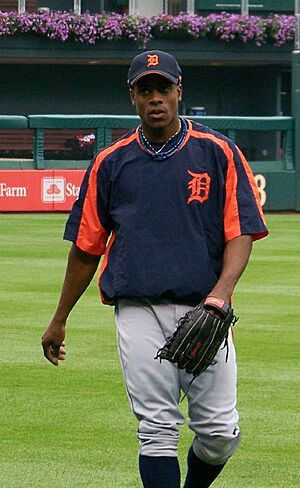
Strong Seasons and a No-Hitter (2007)
The Tigers continued to be a strong team in 2007. Justin Verlander threw the Tigers' first no-hitter at Comerica Park. Magglio Ordóñez won the AL batting title.
New Talent and Close Calls (2008–2009)
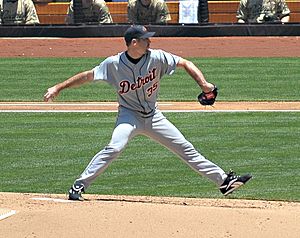
In 2008, the Tigers acquired star players Miguel Cabrera and Dontrelle Willis. Despite a tough start, the team set an attendance record. In 2009, Justin Verlander had a great season, and the Tigers were in first place for much of the year. However, they lost a tie-breaker game to the Minnesota Twins on the last day of the season, missing the playoffs.
The Near-Perfect Game (2010)
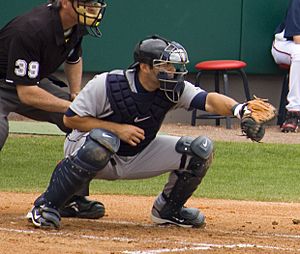
In 2010, Armando Galarraga was pitching a perfect game against the Cleveland Indians. With two outs in the ninth inning, the first-base umpire made a controversial call, ruling a runner safe when replays showed he was out. Galarraga missed his perfect game, but the umpire later apologized, showing great sportsmanship.
Division Winners (2011–2014)
First AL Central Championship (2011)
The Tigers had an amazing 2011 season. Justin Verlander threw his second career no-hitter and became the first pitcher since 1991 to win 20 games. He also won the pitching triple crown, the AL Cy Young Award, and the AL MVP award! José Valverde led the AL in saves, and Miguel Cabrera won the AL batting title. The Tigers clinched their first AL Central Division title since joining the division in 1998. They beat the New York Yankees in the ALDS but lost to the Texas Rangers in the ALCS.
American League Champions (2012)
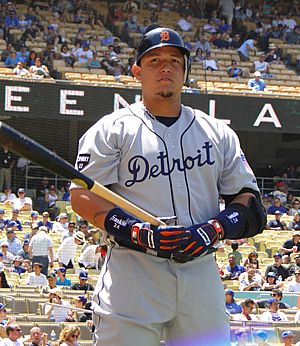
In 2012, the Tigers signed star first baseman Prince Fielder. Miguel Cabrera moved to third base. The Tigers clinched their second straight AL Central division title. On the final day of the season, Miguel Cabrera achieved the rare Triple Crown, leading the AL in batting average, home runs, and RBIs. He was named AL MVP.
The Tigers defeated the Oakland Athletics in the ALDS. They then swept the New York Yankees in the ALCS to win their 11th AL pennant and reach the 2012 World Series. However, they were swept by the San Francisco Giants in the World Series.
American League Title Defense (2013)
The Tigers continued their success in 2013, winning their third consecutive AL Central Division title. Miguel Cabrera was voted AL MVP for the second straight season, and Max Scherzer won the AL Cy Young Award. The Tigers beat the Oakland Athletics in the ALDS but lost to the Boston Red Sox in the ALCS.
Changes and Another Division Title (2014)
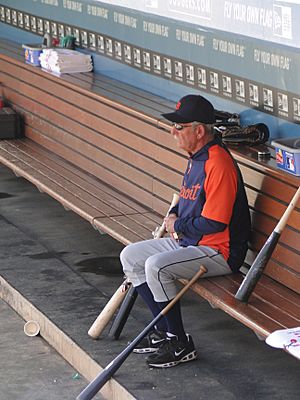
Jim Leyland stepped down as manager, and Brad Ausmus took over. The Tigers traded Prince Fielder for Ian Kinsler and acquired pitcher David Price. With Price, the Tigers became the first team in history to have three consecutive Cy Young Award winners in their starting rotation. The Tigers clinched their fourth consecutive AL Central Division title on the last day of the season. They lost to the Baltimore Orioles in the ALDS.
Mid-Season Reboot (2015)
The 2015 season started well but then faced challenges with injuries and inconsistent play. The team decided to "reboot" and traded several key players like David Price and Yoenis Céspedes for young prospects. Al Avila became the new general manager. Miguel Cabrera still had a great season, winning his fourth batting title.
A Strong Effort (2016)
The Tigers made some new additions, including pitchers Jordan Zimmermann and Francisco Rodriguez. They finished the season with a good record but just missed a wild card playoff spot. Pitcher Michael Fulmer won the AL Rookie of the Year Award.
Rebuilding the Team (2017–2023)
Owner Mike Ilitch Passes Away (2017)
Mike Ilitch, the Tigers owner since 1992, passed away in 2017. The team began a rebuilding process, trading several star players like J. D. Martinez and Justin Verlander for future talent. The Tigers finished with one of the worst records in MLB, which gave them the top pick in the 2018 MLB Draft.
New Manager and Continued Rebuilding (2018–2020)
Ron Gardenhire became the new manager in 2018. The team continued to rebuild with young players. In 2019, the Tigers had their second-worst season in franchise history. In 2020, during a shortened season due to the COVID-19 pandemic, Ron Gardenhire retired, and Lloyd McClendon became interim manager.
New Leadership and a No-Hitter (2021–2023)
In 2020, A. J. Hinch was hired as manager. In 2021, Spencer Turnbull pitched the eighth no-hitter in Tigers history. The team finished better than expected. In 2022, Al Avila was fired as general manager, and Scott Harris became president of baseball operations. In 2023, Jeff Greenberg was hired as general manager. Long-time Tigers slugger Miguel Cabrera retired from playing and joined the team's front office.
Return to the Playoffs (2024–Present)
Playoff Appearances (2024–2025)
In 2024, the Tigers surprised many by making the playoffs for the first time since 2014. They swept the Houston Astros in the Wild Card Series but lost to the Cleveland Guardians in the ALDS. In 2025, despite a strong start, the Tigers had a tough second half. However, they still clinched a playoff spot for the second year in a row. They defeated the Guardians in the Wild Card Series but lost to the Seattle Mariners in the ALDS.
Best Seasons in Detroit Tigers History
|
|||||||||||||||||||||||||||||||||||||||||||||||||||||||||||||||||||||||||
Worst Seasons in Detroit Tigers History
|
|||||||||||||||||||||||||||||||||||||||||||||||||||||||||||||
Team Nickname: The Tigers
The team was called the Wolverines and Creams in 1894 before becoming the Tigers. There are different stories about how they got their name. One story says it was because of their striped socks. Another, more likely story, is that the name came from a local military group called "The Tigers." This group had played important roles in wars. When the baseball team joined the major leagues, they asked for and received permission to use the name.
Team Rivalries
Chicago White Sox
The Tigers have a long-standing rivalry with the Chicago White Sox. Both teams started in the American League in 1901. They have played each other every year for over 120 seasons. This rivalry is similar to other sports rivalries between teams from Chicago and Detroit.
Divisional Rivals
The Tigers also have rivalries with their division opponents: the Cleveland Guardians, the Kansas City Royals, and the Minnesota Twins. A notable moment in the rivalry with Cleveland happened in 2013. During a close game, fans from both teams chanted back and forth. The Tigers won that game in extra innings. The Tigers and Guardians have met in the playoffs in 2024 and 2025.
Other Rivalries
The Tigers also have rivalries with the New York Yankees from their playoff matchups in 2006, 2011, and 2012. They also have historical rivalries with National League teams they've faced in the World Series, like the Chicago Cubs and St. Louis Cardinals.
Tigers Fanbase
The Tigers have many fans in Michigan, northwestern Ohio, and southwestern Ontario. Cities like Windsor and Sarnia, Ontario, have large groups of loyal Tigers fans. The team's minor league affiliates, like the Toledo Mud Hens and Erie SeaWolves, also help grow their fan base in nearby areas.
Home Attendance at Comerica Park
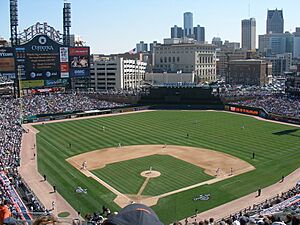
| Home attendance at Comerica Park | ||||
| Year | Total attendance | Game average | League rank | |
| 2000 | 2,438,617 | 30,106 | 7th | |
| 2001 | 1,921,305 | 23,720 | 9th | |
| 2002 | 1,503,623 | 18,795 | 12th | |
| 2003 | 1,368,245 | 16,892 | 13th | |
| 2004 | 1,917,004 | 23,667 | 9th | |
| 2005 | 2,024,431 | 24,993 | 10th | |
| 2006 | 2,595,937 | 32,049 | 5th | |
| 2007 | 3,047,133 | 32,719 | 3rd | |
| 2008 | 3,202,645 | 39,539 | 3rd | |
| 2009 | 2,567,165 | 31,693 | 4th | |
| 2010 | 2,461,237 | 30,386 | 6th | |
| 2011 | 2,642,045 | 32,618 | 6th | |
| 2012 | 3,028,033 | 37,383 | 5th | |
| 2013 | 3,083,397 | 38,067 | 3rd | |
| 2014 | 2,917,209 | 36,015 | 4th | |
| 2015 | 2,726,048 | 33,655 | 5th | |
| 2016 | 2,493,859 | 31,173 | 7th | |
| 2017 | 2,321,599 | 28,662 | 7th | |
| 2018 | 1,856,970 | 22,926 | 10th | |
| 2019 | 1,501,430 | 18,536 | 12th | |
| 2020 | N/A (COVID-19 pandemic) | N/A | N/A | |
| 2021 | 1,102,623 | 13,612 | 11th | |
| 2022 | 1,575,544 | 19,214 | 10th | |
| 2023 | 1,612,876 | 19,912 | 12th | |
| 2024 | 1,858,295 | 22,942 | 11th | |
| 2025 | 2,413,442 | 29,796 | 7th | |
Team Rally Cries
Over the years, the Tigers have had many popular rally cries. In 1968, fans cheered with "Go Get 'Em, Tigers!" and "Sock it to 'em, Tigers!" During their 1984 World Series win, the phrase "Bless You Boys" became famous. In 2005 and 2011, the slogan was "Who's Your Tiger?" In 2006, "Gum Time" became a popular dugout cheer. A local fan's chant, "Eat 'Em Up Tigers! Eat 'Em Up!", was also very well-known. In 2018, a goose that appeared on the field during a game became known as the "Rally Goose" after the Tigers started scoring runs.
Uniforms and Logos
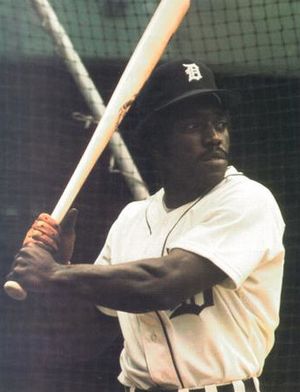
The Tigers have worn mostly the same home uniform since 1934. It's a white jersey with navy blue trim and an Old English "D" on the chest. Their hats are navy blue with a white "D." For road games, the "D" on their hats is orange, and the jersey says "Detroit" in a script style. The Old English "D" first appeared on uniforms in 1904.
Special Uniform Features:
- The Tigers are the only MLB team to use a color (orange) on their road uniforms that isn't on their home uniforms.
- Their uniform pants have more belt loops than other teams.
Alternate Jerseys: The Tigers sometimes wear special jerseys. They wear throwback jerseys of the Detroit Stars to honor Negro leagues players. For their "¡Fiesta Tigres!" game, they wear white and navy blue jerseys with "Tigres" across the chest to celebrate Hispanic and Latino players.
In 2024, the Tigers introduced their first City Connect jersey. This navy blue jersey has electric blue tire tread patterns and says "Motor City" on the front, celebrating Detroit's car industry. It also features racing stripes and a special patch that nods to Detroit's highways and area code.
Baseball Hall of Famers
| Detroit Tigers Hall of Famers | |||||||||
|---|---|---|---|---|---|---|---|---|---|
| Affiliation according to the National Baseball Hall of Fame and Museum | |||||||||
|
Ford C. Frick Award Recipients
| Detroit Tigers Ford C. Frick Award recipients | |||||||||
|---|---|---|---|---|---|---|---|---|---|
| Affiliation according to the National Baseball Hall of Fame and Museum | |||||||||
|
Michigan Sports Hall of Fame Members
| Detroit Tigers in the Michigan Sports Hall of Fame | ||||
| No. | Name | Position | Tenure | Notes |
|---|---|---|---|---|
| — | Frank Navin | Owner | 1908–1935 | |
| — | Walter Briggs Sr. | Owner | 1919–1935 | |
| — | John Fetzer | Owner | 1961–1983 | |
| — | Mike Ilitch | Owner | 1992–2017 | |
| — | Marian Ilitch | Owner | 1992 | |
| — | Jim Campbell | Executive | 1962–1983 1978–1990 1990–1992 |
|
| — | Ty Tyson | Broadcaster | 1927-1942 | |
| — | Paul Carey | Broadcaster | 1973–1991 | |
| — | Ernie Harwell | Broadcaster | 1960–1991 1993–2002 |
|
| — | Van Patrick | Broadcaster | 1949, 1952–1959 | |
| — | Ray Lane | Broadcaster | 1967–1972, 1999-2003 | |
| — | Frank Beckmann | Broadcaster | 1995-2003 | |
| — | Ty Cobb | CF Manager |
1905–1926 1921–1926 |
|
| — | Sam Crawford | OF | 1903–1917 | |
| — | Wish Egan | P | 1902 | |
| — | Harry Heilmann | RF/1B Broadcaster |
1914 1916–1929 |
|
| — | Hughie Jennings | IF Manager |
1907, 1909–1910, 1912, 1918 1907–1920 |
|
| — | Heinie Manush | LF | 1923–1927 | |
| — | George Mullin | P | 1902–1913 | |
| 1 | Lou Whitaker | 2B | 1977–1995 | |
| 2 | Charlie Gehringer | 2B GM |
1924–1942 1951–1953 |
|
| 3 | Mickey Cochrane | C Manager |
1934–1937 1934–1938 |
|
| 3 | Dick McAuliffe | 2B/SS | 1960–1973 | |
| 3 | Alan Trammell | SS Coach Manager |
1977–1996 1999 2003–2005 |
|
| 4 | Goose Goslin | LF | 1934–1937 | |
| 4 | Rudy York | 1B | 1934, 1937–1945 | |
| 4 | Charlie Maxwell | LF | 1955–1962 | |
| 5 | Hank Greenberg | 1B | 1930, 1933–1941 1945–1946 |
|
| 5, 20 | Vic Wertz | RF/1B | 1947–1952 1961–1963 |
|
| 5 | Jim Northrup | OF | 1964–1974 | |
| 6 | Al Kaline | RF Broadcaster |
1953–1974 | |
| 7 | Billy Rogell | SS | 1930–1939 | |
| 7, 26 | Harvey Kuenn | OF/SS | 1952–1959 | |
| 7 | Rick Leach | OF/1B | 1981–1983 | |
| 10 | Tommy Bridges | P | 1930–1943 1945–1946 |
|
| 10 | Jim Leyland | Manager | 2006–2013 | |
| 11 | Sparky Anderson | Manager | 1979–1995 | |
| 11 | Bill Freehan | C | 1961, 1963–1976 | |
| 13 | Lance Parrish | C | 1977–1986 | |
| 14 | Schoolboy Rowe | P | 1933–1942 | |
| 14, 15 | Jim Bunning | P | 1955–1963 | |
| 15, 21 | George Kell | 3B Broadcaster |
1946–1952 1959–1963 1965–1996 |
|
| 16 | Hal Newhouser | P | 1939–1953 | |
| 17 | Denny McLain | P | 1963–1970 | |
| 18 | John Hiller | P | 1965–1970 1972–1980 |
|
| 20 | Billy Pierce | P | 1945, 1948 | |
| 21 | Barney McCosky | OF | 1939–1942, 1946 | |
| 21, 30 | Don Lund | OF | 1949, 1952–1954 | |
| 21 | Willie Hernández | P | 1984–1989 | |
| 22 | Virgil Trucks | P | 1941–1952, 1956 | |
| 23 | Willie Horton | LF/DH | 1963–1977 | |
| 23 | Kirk Gibson | OF Coach Broadcaster |
1979–1987 1993–1995 2003–2005 |
|
| 24 | Mickey Stanley | CF | 1964–1978 | |
| 25 | Norm Cash | 1B Broadcaster |
1960–1974 | |
| 26 | Gates Brown | LF Coach |
1963–1975 1978–1984 |
|
| 26 | Frank Tanana | P | 1985–1992 | |
| 29 | Mickey Lolich | P | 1963–1975 | |
| 47 | Jack Morris | P Broadcaster |
1977–1990 | |
Retired Numbers and Honorees
This is how the retired numbers and honored names are displayed on the outfield walls at Comerica Park:
In left field:
|
In right field:
|
- Ty Cobb, Harry Heilmann, Heinie Manush, Hughie Jennings, and Sam Crawford are honored with their names on the wall. They played before numbers were worn on jerseys.
- The names of Mickey Cochrane and George Kell are also displayed to honor their contributions.
- Al Kaline and George Kell also worked as TV commentators for the Tigers.
- Ernie Harwell was a beloved Tigers radio and television announcer for 42 years.
- Jackie Robinson's No. 42 was retired across all of Major League Baseball in 1997.
Most players with retired numbers (and Ty Cobb) also have statues behind their names on the left-center field wall. The most recent number retired by the Tigers was Jim Leyland's No. 10 on August 3, 2024.
Team Captains
- Bill Coughlin 1907–1908
- Germany Schaefer 1907–1909
- George Moriarty 1911–1916
- Brad Ausmus 1999
- Doug Brocail 1999
- Dean Palmer 1999
Award Winners
Team Roster
|
Detroit Tigers 2023 spring training roster
|
||||||
|---|---|---|---|---|---|---|
| 40-man roster | Non-roster invitees | Coaches/Other | ||||
|
Pitchers
|
Catchers
Infielders
Outfielders
|
|
Manager
Coaches
40 active, 0 inactive, 0 non-roster invitees
|
|||
Minor League Teams
The Detroit Tigers have seven minor league teams where young players develop their skills.
| Class | Team | League | Location | Ballpark | Affiliated |
|---|---|---|---|---|---|
| Triple-A | Toledo Mud Hens | International League | Toledo, Ohio | Fifth Third Field | 1987 |
| Double-A | Erie SeaWolves | Eastern League | Erie, Pennsylvania | UPMC Park | 2001 |
| High-A | West Michigan Whitecaps | Midwest League | Comstock Park, Michigan | LMCU Ballpark | 1997 |
| Single-A | Lakeland Flying Tigers | Florida State League | Lakeland, Florida | Publix Field at Joker Marchant Stadium | 1963 |
| Rookie | FCL Tigers | Florida Complex League | 1995 | ||
| DSL Tigers 1 | Dominican Summer League | San Pedro de Macorís, San Pedro de Macorís | Detroit Tigers Academy | 1992 | |
| DSL Tigers 2 | 2022 |
Broadcasters
Radio Broadcasts
The Tigers' main radio station is WXYT-FM (97.1 FM). Dan Dickerson does the play-by-play, with Bobby Scales, Dan Petry, and Andy Dirks sharing the color commentary. Games are also broadcast on other stations across Michigan and parts of Ohio.
Television Broadcasts
The Tigers' local television games are shown on FanDuel Sports Network Detroit. The TV team includes Jason Benetti for play-by-play, and former Tigers players Andy Dirks, Dan Petry, Todd Jones, and Carlos Peña as color commentators.
Team Facilities
The team has a training center in the Dominican Republic to help develop new players.
See Also
 In Spanish: Detroit Tigers para niños
In Spanish: Detroit Tigers para niños
- List of Detroit Tigers seasons
- Detroit Tigers all-time roster
- List of Detroit Tigers owners and executives
 | Stephanie Wilson |
 | Charles Bolden |
 | Ronald McNair |
 | Frederick D. Gregory |



